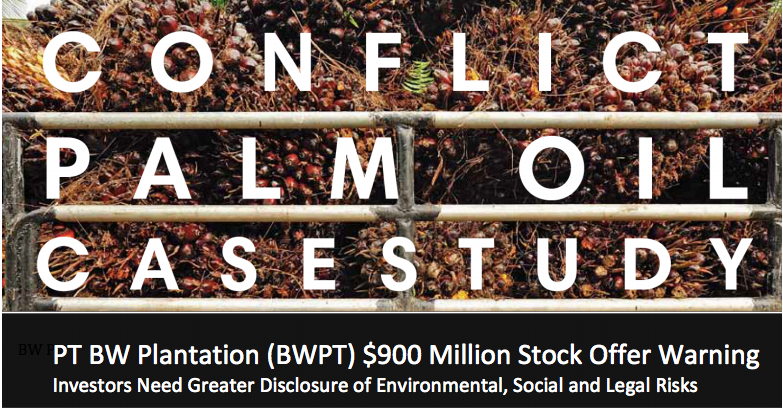RAN briefing finds pending $900 million deal threatens forests, peatlands and communities across Indonesia.
Indonesian palm oil firm BW Plantation (BWPT) approved last week a USD $900 million share rights offering in a bid to finance its merger with Green Eagle Holdings (GEH). New stock not purchased by existing shareholders will be traded on the Jakarta Stock Exchange (IDX) from Monday December 8.
RAN released a briefing note, available here, on the controversial deal today, alerting investors to poorly disclosed Conflict Palm Oil risks.
The deal expands BWPT’s holdings from just under 100,000 ha to over 400,000 ha, propelling it into the rank of Indonesia’s third largest palm oil company listed on the IDX. However, 75% of the new land bank – with holdings in Papua, Sulewesi, West, East and South Kalimantan and Sumatra – is unplanted and includes large tracts of rainforests, Indigenous and local community lands, and areas of carbon-rich peatlands.
Tom Picken, Senior Advisor for Forests and Finance campaign work at RAN, notes, “The last thing Indonesia needs is a near-billion dollar injection of cash that will simply fuel further Conflict Palm Oil production. We encourage potential investors to steer clear of this controversial deal until BWPT discloses the true extent of risks, and publicly commits to no deforestation, no exploitation, and no peatland expansion across its entire operations.”
The briefing finds evidence of aggressive clearance of High Carbon Stock (HCS) forest since 2010, orangutans needing to be rescued from a Kalimantan concession two weeks ago, at least one case of serious labour rights violations this year in Papua, as well as a number of community conflicts in the expanded holdings of the BWPT plantations group.
BWPT is already failing to comply with its obligations under the Roundtable on Sustainable Palm Oil (RSPO) relating to new plantations, much less meet the additional “no deforestation, no peatland expansion and no exploitation” criteria of its major customers.
Actions on the ground will tell the tale. For now, BWPT looks like the new bad boy on the block, making it an important target for intensified public scrutiny and accountability.
